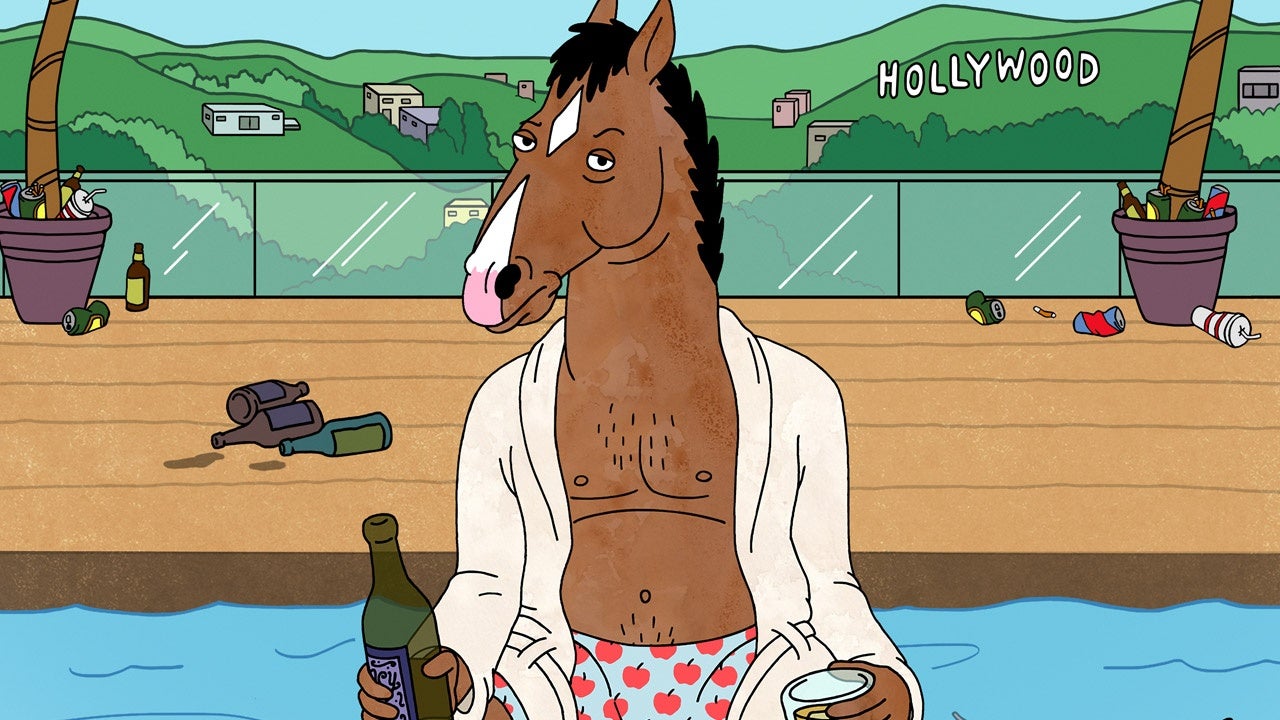BoJack Horseman: The sharp satire of Hollywood that's also the most melancholy comedy on TV
The second season is an ambitious, sharp, and devestatingly sad comedy

When it debuted in 2014, BoJack Horseman was something of a surprise: a sharp critique of Hollywood culture (known as 'Hollywoo' in the show for reasons that are too convoluted to go into) studded with a bizarre, anthropomorphic cast of cats, horses, penguins, whales and, er, people.
The show spanned intricate, weird tales about the price of success, ridiculed famous people and was fluent in the sort of internet-buzzy language that had people quoting it for months.
But beneath the slick, deadpan surface was a show that was also relentlessly sad. BoJack, the titular horse-man voiced by Will Arnett, starts the show as a washed-up former sitcom star.
Living in a glass house in the Hollywoo hills, the intro depicts him wandering, glassy-eyed, through a typical day, rising out of bed, staggering through work, drinking himself into a stupor, tripping off his balcony and falling into his pool. Fame is presented as a joyless trap; an endless loop of mindlessness.
BoJack is a miserable husk of a horse, drinking excessively, taking drugs recreationally and treating women terribly. His housemate, Todd (voiced by Breaking Bad's Aaron Paul) is a dopey sidekick-type who BoJack torments constantly, but only because he's terrified his friend will one day leave him. His intense, destructive phases come in colossal bursts, then he resets, and starts again.
So how does a show that has a severely depressed protagonist and a relentlessly miserable streak work? It cuts through the grim fog permeating BoJack with sharp observational comedy, dumb observational comedy, crude jokes, clever jokes and more famous guest-stars than you can shake an anthropomorphic stick at.
It's incredibly self-aware, rewarding people for spotting sight gags, weird pop culture references and sneaking in the likes of Amy Schumer, Stanley Tucci, J.K Simmons and Naomi Watts in guest-speaking roles.
The second season sees the universe mapped out considerably. Having set up its principal cast in a taut, 13-episode season last year, this year sees the addition of new characters, such as BoJack's new girlfriend Wanda - an owl who is fresh out of a 30 year coma, voiced with a perfect blend of sass and cluelessness by Lisa Kudrow.
With his memoir being published at the end of season one, BoJack is enjoying a new level of fame, having been cast in the biopic of the iconic racing horse Secretariat. But just as he found a hollowness in nobody remembering who he was last year, here he finds a similar gaping emptiness when he is catapulted back into the spotlight.

Watch Apple TV+ free for 7 day
New subscribers only. £9.99/mo. after free trial. Plan auto-renews until cancelled.
ADVERTISEMENT. If you sign up to this service we will earn commission. This revenue helps to fund journalism across The Independent.

Watch Apple TV+ free for 7 day
New subscribers only. £9.99/mo. after free trial. Plan auto-renews until cancelled.
ADVERTISEMENT. If you sign up to this service we will earn commission. This revenue helps to fund journalism across The Independent.
Part of the charm of BoJack's second season is in its ambitiousness, as characters are thrust together in bizarre new stories. To name just a few: there's a plot to steal a genetically modified chicken from a family of anthropomorphic chickens who run a KFC-style factory; one character joins an improv comedy troupe with sinister ulterior motives, and there's an auto-asphyxiation story line that will make you never look at lemons the same way again.
Fans of shows like Bob's Burgers, 30 Rock and Archer will be immediately drawn to BoJack's unique blend of sharp surrealism. It's a show that's often cleverer than it is laugh-out-loud funny, but it's one of the most ambitious shows on television.
The season only really falters when it starts relying on the sitcom rules it worked so hard to parody last year. Padding out one-off jokes into larger storylines, like BoJack's agent Caroline dating a man who is actually a boy in a trench coat, is a plot that quickly grows contrived. And keeping Todd away from BoJack, when the dynamic between the two is so ripe for comedy, feels like a waste.
But just as season one started out zany, only to peel back to reveal a darker, emotionally raw underbelly, Season Two explores a surprising amount of emotional turmoil, too, as the characters orbiting BoJack all seem stuck in their own perpetually destructive loops.
As one character notes in a particularly bruised episode towards the end of the season, “When you look at someone with rose-coloured glasses, all the red flags look just like... flags.” And BoJack's chain-smoking mother has some excellent (if bleak) lines in the first episode.
A show with a relentlessly sad, misfortunate cast doesn't sound like the kind of thing you'd want to binge on a weekend. So it's a testimony to BoJack Horseman's writing, then, that a show featuring a variety of talking animals can feel so intrinsically human.
From the trippy, bluesy intro music (composed by The Black Keys' Patrick Carney) to the solemn sing-a-long that ends each episode (sample lyric 'And I'm trying to hold on to my past/ It's been so long I don't think I'm gonna last'), BoJack revels in the contrast and conflict of life, even if, as it likes to remind us, the end of one cycle is only just the beginning of another.
BoJack Horseman season 1 & 2 are available now on Netflix
Join our commenting forum
Join thought-provoking conversations, follow other Independent readers and see their replies
Comments
Bookmark popover
Removed from bookmarks